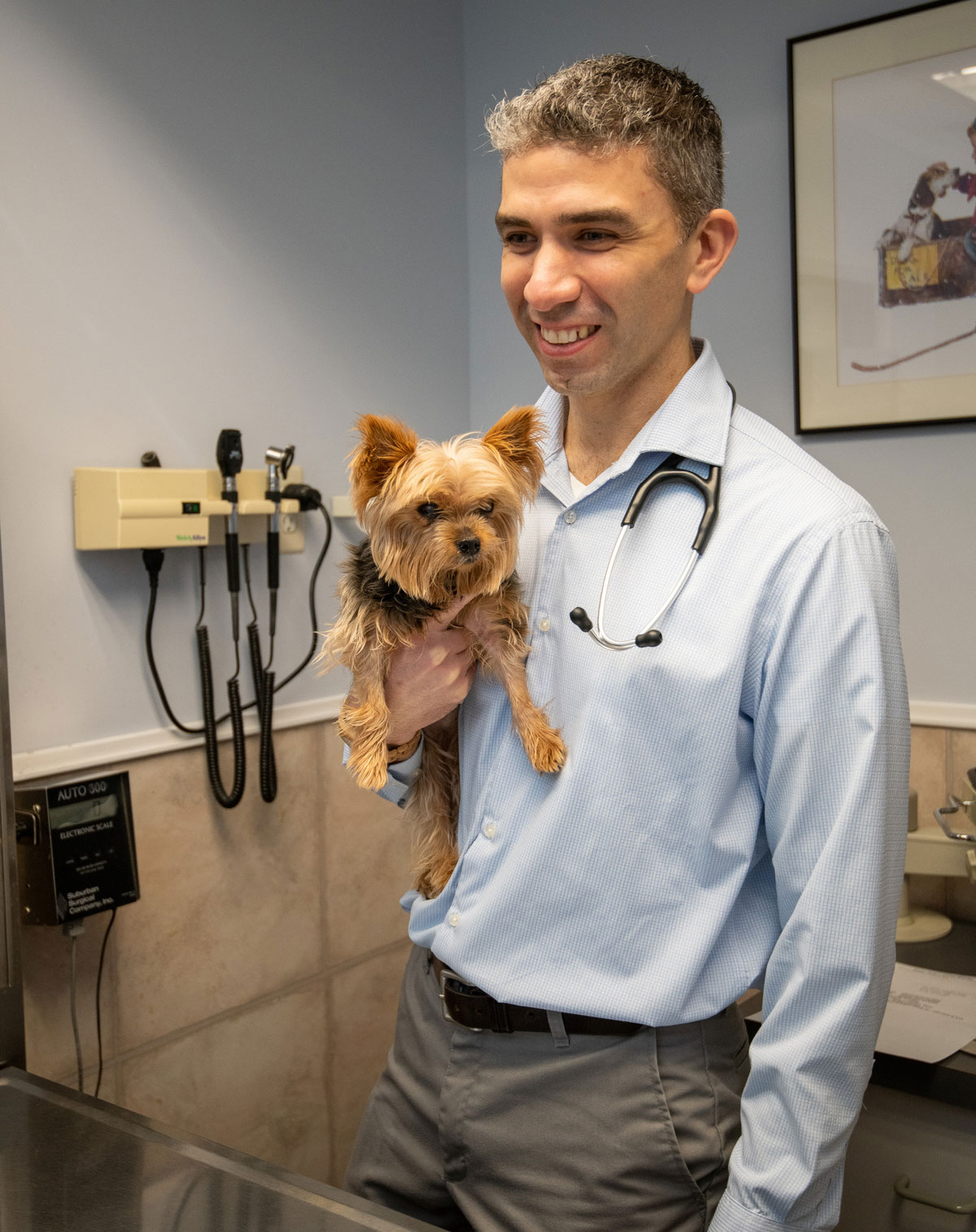
Pet Vaccinations
Whenever possible, preventing disease is always better than treating disease. Prevention protects your pet from suffering the pain and discomfort of illness. Plus, it is also usually much less expensive than the cost of treating disease. Vaccinations are a scientifically proven method for preventing the contraction of several highly contagious, life-threatening, and zoonotic (contagious to humans) diseases in both pets and people. Pets often contract these types of illnesses when around other pets, wild animals, or when exposed to parasites.
Vaccinations work by essentially training the immune system to combat specific viruses or bacteria. Vaccinations contain a small amount of these inactive or partial microbes. When injected, your pet’s immune system develops antigens specially designed to combat the specific disease. Your pet’s immune system then “remembers” the disease and how to fight it. If exposed in the future, your pet’s immune system will recognize the disease and kill it immediately.
Vaccinations are broken into two categories: core vaccines and non-core vaccines. Core vaccinations are those that are highly recommended for your pet’s safety or required by law. Non-core vaccinations are elective and usually recommended based on a pet’s lifestyle and environment. Our veterinarians will help you determine which vaccinations your pet should have.
Vaccine Guidelines
To our clients:
Recent research into the duration of immunity by the vaccines we are currently recommending has shown some very interesting trends. In an age where all of us have become more conscious of the possible ill effects of properly prescribed medicines, to find that we can actually decrease the frequency of our ‘core’ vaccines was a welcome surprise.
The new guidelines will be followed except for certain situations such as:
- Early vaccination is requested by the owner
- Vaccination is required for travel or boarding
- Your pet has a medically diagnosed disease that prevents them from receiving vaccines safely
Canine Distemper/Parvovirus combination vaccine (core vaccine)
- This vaccination is initially given to puppies between 5-7 weeks of age. Each puppy will then receive a booster every 3-4 weeks until 15-16 weeks of age, a booster 1 year later, and further boosters every 3 years.
- Adult dogs who have no prior vaccination history will receive this vaccination at time of presentation, have a booster performed 1 year later and further boosters every 3 years.


Feline Distemper/Upper Respiratory combination vaccine (core vaccine)
- This vaccination is initially given to kittens between 5-7 weeks of age. Each kitten will then receive a booster every 3-4 weeks until 15-16 weeks of age, a booster 1 year later, and further boosters every 3 years.
- Adult cats who have no prior vaccination history will receive this vaccination at time of presentation, have a booster performed 1 year later and further boosters every 3 years.
Canine Rabies Vaccine (core vaccine)
- This vaccination is required by New York State Law
- This vaccination is initially given to puppies between 12-16 weeks of age. Each puppy will then receive a booster 1 year later, and further boosters every 3 years.
- Adult dogs who have no prior vaccination history will receive this vaccination at time of presentation, have a booster performed 1 year later and further boosters every 3 years.

Feline Rabies Vaccine (core vaccine)
- This vaccination is required by New York State Law for all cats whether indoor or outdoor
- This vaccination is initially given to kittens between 12-16 weeks of age. Each cat will then receive subsequent boosters every 1 year. Efficacy studies still show this needs to be boostered annually.
Bordetella and Canine Influenza Vaccines (non-core vaccines) - the "Social Butterfly" Diseases

These vaccinations are recommended for dogs with the following risk factors:
- Enjoys meeting or playing with other dogs
- Stays in a boarding kennel
- Spends time in doggie daycare
- Attends or participates in dog shows or agility competitions
- Lives in, may live in, or visits a shelter environment
- Groomed in a grooming facility
- Visits dog parks
Bordetella (also known as Kennel Cough) is given as an intranasal vaccination. It can be given as young as 6 weeks of age and has to be boostered yearly
Canine Influenza – we recommend and administer a bivalent vaccine at Sleepy Hollow Animal Hospital. This vaccine protects against both H3N8 and H3N2 strains of the virus.
- Dogs will receive an initial primer vaccine (puppies can be vaccinated as young as 10 weeks old), then a booster approximately 3-4 weeks later and then yearly as long as they remain at risk
Lyme Disease and Leptospirosis vaccines (non-core vaccines) - the "Outdoor Lifestyle" Diseases

Lyme Disease
- We live an endemic area for Lyme Disease and highly recommend that all dogs who spend any time in wooded, grassy or brush-filled areas OR who have previously been found to have tick exposure, receive this vaccination
- Dogs will receive an initial primer vaccine (puppies can be vaccinated as young as 12 weeks old), then a booster approximately 3-4 weeks later and then yearly as long as they remain at risk
Leptospirosis is recommended for dogs if they have any of the following risk factors:
- Drinks from, swims in or wades in fresh water lakes, rivers, streams, ponds, marshes, etc
- Walks or lays on soil where wildlife or livestock could have urinated
- Spends time in a yard currently or previously used by livestock
- Spends time in an environment with a high population of wild rats
- Dogs will receive an initial primer vaccine (puppies can be vaccinated as young as 12 weeks old), then a booster approximately 3-4 weeks later and then yearly as long as they remain at risk
Feline Leukemia Virus Vaccine (non-core vaccine)
- This is a virus readily transmitted from cat to cat and is a pervasive disease in the outdoor feline population. We recommend all cats who go outdoors, off-leash receive this vaccination
- Cats will receive an initial primer vaccine (kittens as young as 12 weeks old), then a booster approximately 3-4 weeks later and then yearly as long as they remain at risk

- For the most up to date recommendations for dogs, please click here
- For the most up to date recommendations for cats, please click here
Please understand, we at Sleepy Hollow Animal Hospital feel that our role in your pet’s care is to provide you with the most up-to-date information in order for YOU to determine what is best for your pet. Please don’t hesitate to discuss your concerns with us !!
Remember the longstanding motto at Sleepy Hollow Animal Hospital:
“For your pet’s health, and your peace of mind!”










